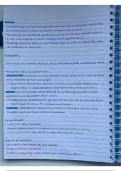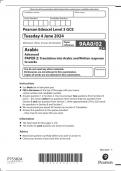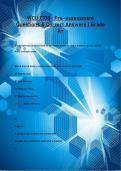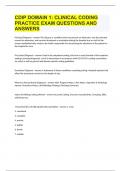Content
Week 1...............................................................................................................................2
Aristotle – Metaphysics Book VII...................................................................................................2
Descartes – Meditation II: Of the Nature of the Human Mind; And That it is More Easily Known
than the Body................................................................................................................................2
Aydin - Extimate Technology: The Essentialist and Dualist Self and Why It Cannot Be Sustained. .3
Week 2...............................................................................................................................5
G.W.F. Hegel – The Phenomenology of the Mind..........................................................................5
Friedrich Nietzsche – Thus Spoke Zarathustra...............................................................................7
Ciano Aydin - From “Self” to “Self-Formation”..............................................................................8
Week 3.............................................................................................................................10
Herbert Marcuse – Social Implications of Modern Technology (1941).........................................10
Martin Heidegger – The Age of the World Picture (from the Question Concerning Technology). 12
Week 4.............................................................................................................................14
Jos de Mul – Digitally Mediated (Dis)embodiment......................................................................14
Arnold Gehlen – A Philosophical-Anthropological Perspective on Technology............................16
Week 5.............................................................................................................................17
Clark & Chalmers – The Extended Mind.......................................................................................17
Donna Haraway – A Cyborg Manifesto: Science, Technology, and Socialist Feminism in the Late
Twentieth Century......................................................................................................................19
Ciano Aydin – The Artifactual Mind (Ch. 4 from Extimate Technology)........................................21
Week 6.............................................................................................................................23
Habermas – The Debate on the Ethical Self-Understanding of the Species (From the Future of
Human Nature)...........................................................................................................................23
Nick Bostrom – In Defense of Posthuman Dignity (2005).............................................................25
Ciano Aydin – Technological Self-Formation as Enhancement (From Extimate Technology)........27
Week 7.............................................................................................................................29
Ciano Aydin - Technological Uncanny as Permanent Structure of Selfhood (From: Extimate
Technology).................................................................................................................................29
Ciano Aydin – Self-Formation as Sublimation and the Question Concerning Technology (From:
Extimate Technology)..................................................................................................................31
Ciano Aydin – Technological Sublimation Theory Applied to Three Technological Fields (From:
Extimate Technology)..................................................................................................................33
,Week 1
Aristotle – Metaphysics Book VII
A thing may be said to be something in the sense that it is a thing, or in the sense that a thing has a
certain quality. In the first sense, you can say: this is man. In the second sense, you can say: this thing
is tall. However, in this second sense, this quality can’t exist without a substance to belong to.
Therefore, in the most primary sense, that which is, must be substance. To know something fully, we
need to know what kind of substance it is. A substance belongs to bodies. Aristotle wonders whether
only bodies have a substance and whether substance always has to be sensible. Substance, according
to him, can be applied to four types of objects: the essence, the universal, the genus and the
substratum. The substratum is the underlying reality of things, which can be matter (or form, or a
combination). Aristotle investigates the essence, which is what a thing is in virtue of itself. Definition
and essence are both in the primary sense belonging to substances.
What role would Aristotle ascribe to mental processes? It seems that he mainly focuses on material
substance.
It could be that Aristotle would ascribe mental processes as a quality of material substances.
Descartes – Meditation II: Of the Nature of the Human Mind; And
That it is More Easily Known than the Body
Descartes tries to get forward by applying the hyperbolic doubt to his experiences to find things that
are certain beyond the fact that he exists. He can’t be sure about attributes belonging to his body,
but he can find that he is sure that he is a thinking thing. Thinking, contrary to the senses, doesn’t
need anything physical. One is a thing that perceives and imagines as well, this is part of the thinking.
But we can’t be sure that perception and imagination are reliable. Considering external objects,
Descartes examines a piece of wax. Even though its form and color and smell change, it still is the
same wax. Descartes concludes that he can be sure that external bodies exist as extended things,
when they are not simply perceived or imagined, but understood clearly and distinctly by thought.
This is the case because God would not deceive him into thinking that material objects exist. The
mind and body are intertwined into one unit. He still remains his mind-body dualism however. The
mind is essential to the self, the body isn’t.
How does Descartes at first doubt that external objects exist, but later on finds that they certainly
exist, because they can be thought clearly and distinctly? Why can’t an evil demon fool him now?
I am not sure whether in the second mediation, Descartes just thought of the argument that a God
wouldn’t fool him. It would explain my question if this were an argument he hadn’t thought of
before.
,Aydin - Extimate Technology: The Essentialist and Dualist Self and
Why It Cannot Be Sustained
Aydin investigates Aristotle’s notion of essence and how Descartes attributes this to the self.
Descartes highlights independence as the most important feature of essence. He investigates the
essentialist and dualist self and why it cannot be sustained, even though it seems alluring.
Aristotle’s grounding of essentialism
Aristotle develops his notion of essence based on Plato. Plato finds that things have a fixed ousia,
independent of their relation to people. Ousia functions as a stable standard for perfection.
Perceptible things can be perfected in the light of imperfects Ideas of how things should be,
according to their essence. Aristotle disagrees that the perceptible world does not really contain the
essence, is not really. Plato’s Ideas don’t explain the state of affairs of the perceptible world, nor
increase our knowledge of it. We should look at real life subject in research.
Aristotle sees essence as the unchanging ground of things, it is primary. They ground less
essential predicates of things. The ousia has primacy over other modes of being. It is more important
to know what something is, than how big something is for example. Without ousia, there is nothing.
When a thing changes, the ousia is the invariable ground that makes change possible.
The ousia is also a kind of cause. But not in the form of matter, since matter is not
determined in itself. To identify unity and distinctness of things, we need our thinking, not simply our
senses. Our thinking aims at the world more generally, not just looking at what matter is present. We
can then identify the form (eidos) of things, which determines the matter. It is more crucial than
matter in ensuring the identity of a thing. The form is the causa finalis of a thing, it is the aim of the
matter. We need to know the purpose of a thing to understand it. This has become Aristotle’s
teleological view of the world.
Essence to Plato is a paradigm from which we derive the standard for what something is.
Aristotle thinks this ousia things can be found in the things themselves, instead of in an imperceptible
reality. However, they both agree with an invariable, uniform, independent essence to things. Also,
they both believe that the individual is dependent on and can only be explained by the general.
Descartes’ elevation of the self to an independent substance
Aristotle investigates the world based on how things appear to us. Then, he thinks he’ll in the end
find first principles. Descartes’ skepticism doesn’t work this way. He uses theoretical reasoning to
find out certain starting principles. Contrary to Aristotle, he finds that the human self is independent
from the physical world. Descartes finds one can know something for sure, when it is perceived
clearly and distinctly. These two are innate ideas used as a grounding, which shows Descartes’
subjective turn: principles are grounded based on the mind, instead of things. He also used the idea
of the perfect, benevolent God, which must exist, because we as imperfect beings wouldn’t be able
to produce the idea a perfect being otherwise. God provides us with clear and distinct ideas.
According to Descartes, every substance has a main attribute that forms the core of that substance
and which all other attributes as modes depend upon.
Descartes shows with the wax example that a lot of things can change about it, while still
remaining wax. The essence of matter/a body consequently is extension. It is an extended substance.
Size, shape, motion and position are simply inessential modes of extension. Extended bodies can
exist independent of the mind, because they can be clearly and distinctly thought and God is not a
deceiver. Other things like sensory perception are just properties of our minds according to
Descartes, while Aristotle thinks they are more valuable and objective. He has a mechanical
worldview, but finds that free will exists as self-control guided by reason n cases of clear and distinct
perception.
Why the essentialist approach is alluring but untenable
, Aristotle and Descartes differ in their view on essence. According to Aristotle, it can be found in
things themselves, while Descartes finds that the self is detached from the material world. It
intuitionally feels good to think something has a stable, truthful essence. Descartes’ view on a
independent self aligns with modern liberalism and individualism. It promotes autonomy in the light
of a world determined by laws of nature.
The ideas of essentialism would consider qualities of multitude, change and relationality to
be less or not real, because they cannot exist on their own. Contrary to Parmenides, how things
something that isn’t can’t change into something which is, Aristotle proposes that change is about a
transition from possible being to actual being. The author doesn’t think this is strong. It does show
Aristotle’s teleology, change happens with a purpose that was present in advance. Something then
gains form, which possesses the essence of the thing. Thus for Aristotle, becoming is not about
something really novel.
The essentialist approach has two fundamental difficulties. First, it excludes the possibility
of real novelty, because everything can be explained by pregiven essences. Contrast this to evolution,
for example. Second, it also fails to account for the dynamic connectedness of things and how they
thus influence each other. It is not clear how Aristotle gets from efficient cause to effect.
To overcome these issues with essentialism, we need to work towards an interactionist view
of the self, where we are dependent on other things for our identity. Aydin proposes an event
ontology to do so, which focuses on events instead of essences as basic constituents of the world.
Being is then derived from events. Playing chess makes a chess player, instead of a chess player plays
chess. An interactionist approach can consider power structures or discourses, narratives, otherness.
Although theoretically we argue in subject-predicate pairs, practically we are always engaged
in relations and interactions already. The interactionist view is related to phenomenology and
mediation theory, but focuses more on how a particular self is constructed, not just how our self-
conception and self-experience are changed.
What role would remain for free will in Aydin’s interactionist view of the self, when we are so
dependent on external events for shaping the self?
I think that he might mean to say that maybe we’re not fully dependent, but should acknowledge
that at least a very large role can be ascribed to our surroundings in shaping the self.






